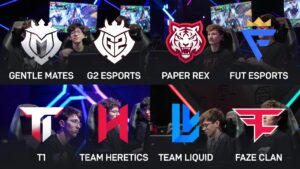Look Sports Media – The fighting game community (FGC) is ablaze with controversy following the revelation that Qiddiya, a Saudi Arabian Public Investment Fund (PIF) company, has acquired RTS, the operator of the Evolution Championship Series (EVO). This acquisition, announced by Qiddiya’s Chief Strategy Officer Muhannad Aldawood on LinkedIn, has ignited a fierce debate about the future of EVO and the implications of Saudi Arabian investment in esports.
While Aldawood touted the acquisition as a "strategic step" to "unlock new opportunities," many within the FGC are expressing deep concerns about the potential impact on EVO’s celebrated inclusivity and diversity. The event has long been a haven for LGBTQ+ players and fans, and the involvement of a nation with a notoriously poor human rights record, particularly regarding LGBTQ+ rights, has understandably caused alarm.

The situation is further complicated by the fact that NODWIN Gaming holds a majority stake in EVO after purchasing Sony Interactive Entertainment’s share in August 2025. This means Qiddiya, while now the operator, doesn’t own the entire brand. However, they will undoubtedly play a significant role in the event’s management and direction.

Related Post
The FGC’s response has been fractured. Some players and fans are committed to maintaining a visible presence at EVO, arguing that participation is crucial for representation and to counter Saudi Arabian "sportswashing" efforts. Others vehemently oppose this approach, believing that attending legitimizes the regime’s human rights abuses. A significant portion of the community is also advocating for increased support of grassroots tournaments and organizations as a direct response.
This division is starkly illustrated by the public debate between professional player Dominique "SonicFox" McLean and esports commentator Duncan "Thorin" Shields. SonicFox, a prominent LGBTQ+ figure, has pledged to continue competing in EVO, emphasizing their refusal to be erased. Thorin, however, criticized this stance, highlighting SonicFox’s past boycotts of EVO over other controversies and questioning the moral implications of accepting Saudi funding. SonicFox defended their decision, arguing that boycotting sexual misconduct and standing against an oppressive government are both valid forms of resistance.
This exchange encapsulates the central dilemma: is maintaining visibility within EVO a form of resistance, potentially empowering the LGBTQ+ community within the event, or does it inadvertently contribute to Saudi Arabia’s image rehabilitation efforts? Boycotting, while potentially highlighting human rights concerns, risks silencing LGBTQ+ voices within a major tournament.
Qiddiya’s investment in EVO is part of a broader pattern of Saudi Arabian expansion into esports, fueled by the PIF. This aggressive investment strategy, while generating significant opportunities, is increasingly drawing criticism due to the country’s human rights record. The future of EVO, and the FGC’s response to this acquisition, will undoubtedly shape the broader conversation surrounding ethical considerations in esports and the potential conflicts between participation, protest, and the pursuit of competitive success. The upcoming EVO France tournament in October will be a crucial test of the community’s resolve.










Leave a Comment